Coronavirus: Why has Bedford got a high infection rate?
- Published
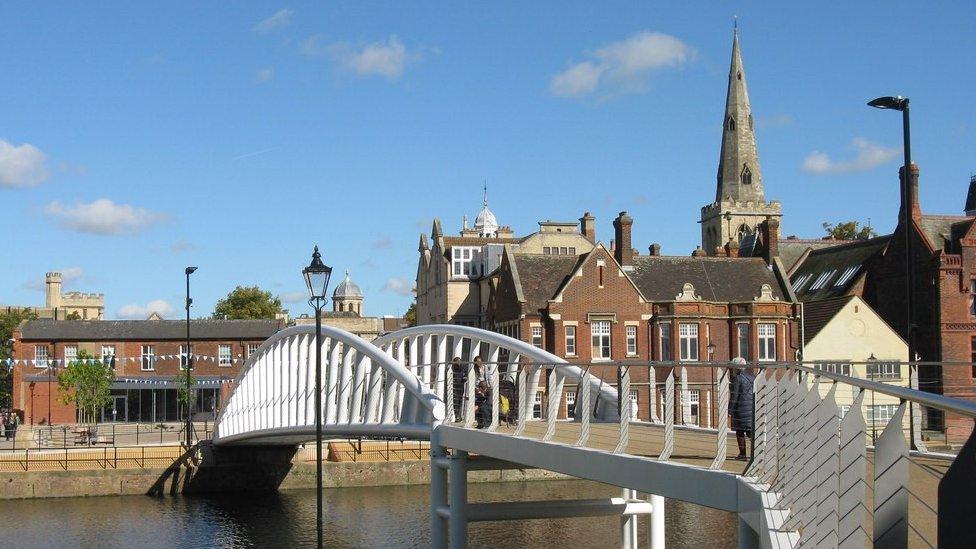
If the data shows a spike in Covid-19 infections in a part of Bedford, measures to lockdown that area could be considered
The market town of Bedford has the highest rate of Covid-19 infections in the south of England. Why is it happening and what can be done to bring it under control?
"I think maybe we need a lockdown, a proper lockdown," said business owner Debbie Moliterno, who has been following the local statistics like a hawk.
Figures show Bedford has England's sixth-highest infection rate, external overall since the start of the pandemic and the fifth highest for new infections recorded in the week to 21 June.
Debbie, a mother-of-eight who owns two boutique clothing shops and two nurseries in Bedford, knows firsthand how devastating coronavirus can be - both she and her husband have had it.
"When you've got it, you know you've got it," she said. "There's no pain like it really. People who haven't had it, or haven't had loved ones have it, are still a bit blasé about it."
Most of England is set to move to a "one metre plus" rule on Saturday. But Bedford Borough Council is urging residents to maintain 2m (6ft) apart and to stay home where possible. Some pubs in the town also plan to postpone reopening.
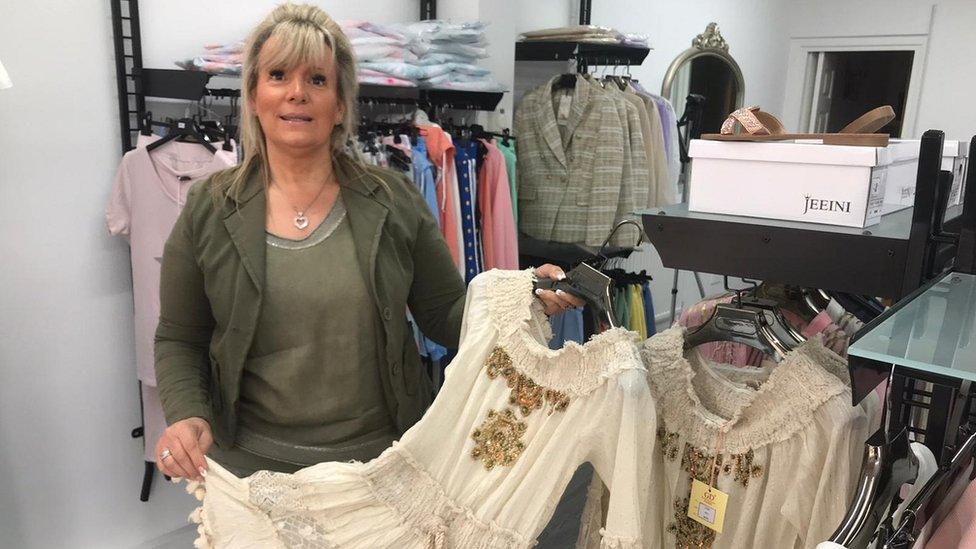
Debbie Moliterno says she can see a local lockdown coming to the town
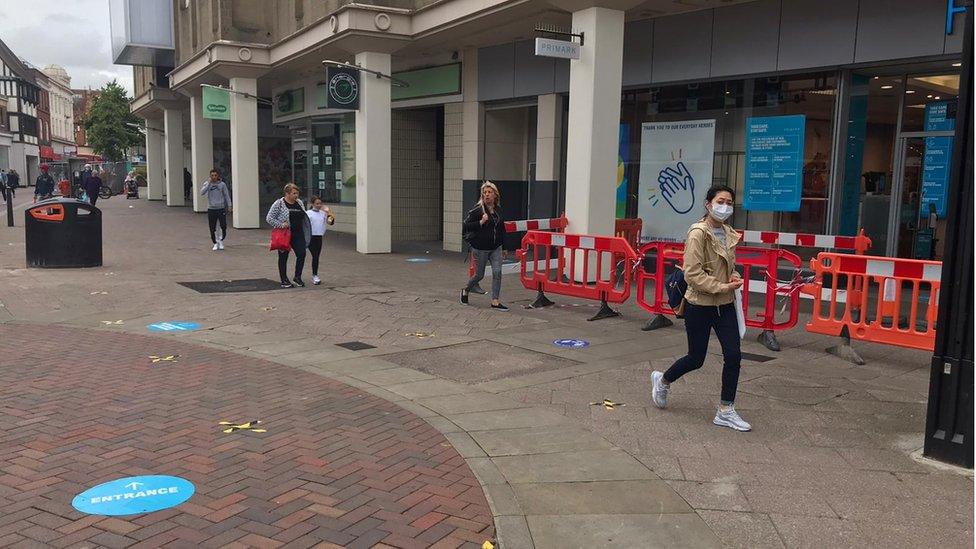
Bedford Council is urging its residents to retain a 2m (6ft) distancing habit and to stay at home whenever possible
In the aftermath of the local lockdown in Leicester, Debbie wonders whether one might be imposed in Bedford.
"I can see it (a local lockdown) coming because the numbers are climbing. I don't know what the answer is. It is frightening," she said.
"Look at Bournemouth - [it's] probably going to see a spike but a lot of the people you saw in Bournemouth came from outside [there]. A local lockdown might not work if people are still coming in from other boroughs, so what do you do? Secure your borders?"
You might also be interested in:
It is not clear why Bedford has a high rate of cases and speculation in the town is rife. Was it the VE celebrations? Was it the various protest gatherings? Is it something else entirely?
Public Health England (PHE) is leading a "deep dive" into the available data and expects to report back on its findings on 14 July.
The council has said the data available to all authorities was insufficiently detailed enough to help the town's leaders understand what was happening in their own backyard. The government has now said it will share postcode-level testing data with councils to help them make decisions.
Elected mayor Dave Hodgson, a Liberal Democrat, said he wanted data that would identify clusters or particular roads or premises with problems, adding: "If we had had the data we could have taken action two or three weeks ago."

Mayor Dave Hodgson says it is not "useful to speculate" about the reasons for high infection rates in Bedford
Labour borough councillor Louise Jackson, who holds the health and wellbeing portfolio, told the Local Democracy Reporting Service the lack of up-to-date data had hampered public health officials.
"The prime minister calls it a whack-a-mole strategy. We know there's a mole out there but we can't see it and we are blindfolded."
But she said the Leicester lockdown could help reinforce health messages in Bedford.
"We are not in a Leicester situation. We have been proactive in our messaging but we have a long, long road ahead and people are starting to understand that we are not in a good place," she said.
The council has this week launched its outbreak control plan, external, which sets out how it would cope with outbreaks in the community.

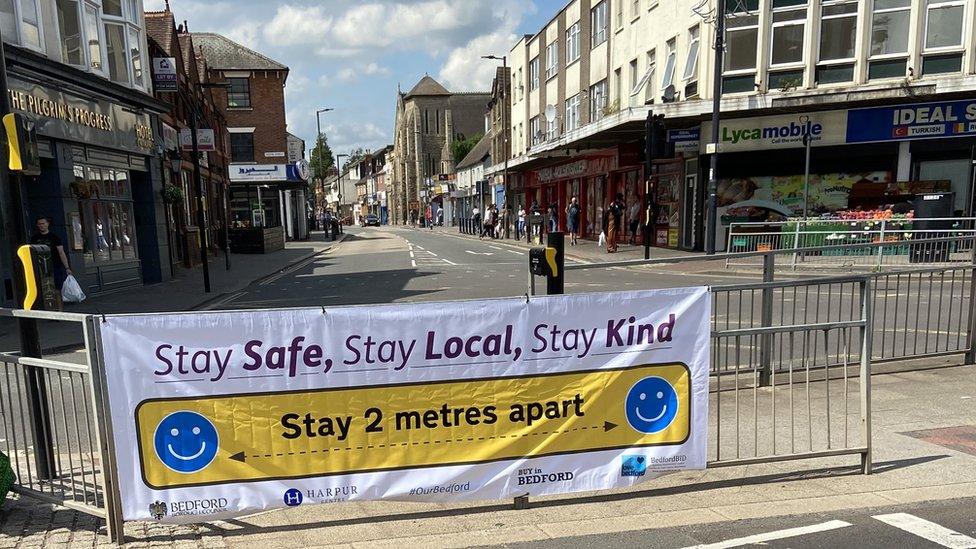
Signs would continue to advise everyone to keep 2m apart, Bedford Borough Council
Analysis - Daniel Wainwright, BBC England Data Unit
According to the government's official coronavirus data dashboard, external, Bedford has one of the highest rates of confirmed cases of Covid-19 in England, with 468 in every 100,000 people.
However, the data PHE breaks down by local authority comprises tests in hospitals or of healthcare workers.
Add cases confirmed outside of hospitals to the mix and, as of 21 June, Bedford had had 694 infections for every 100,000 people.
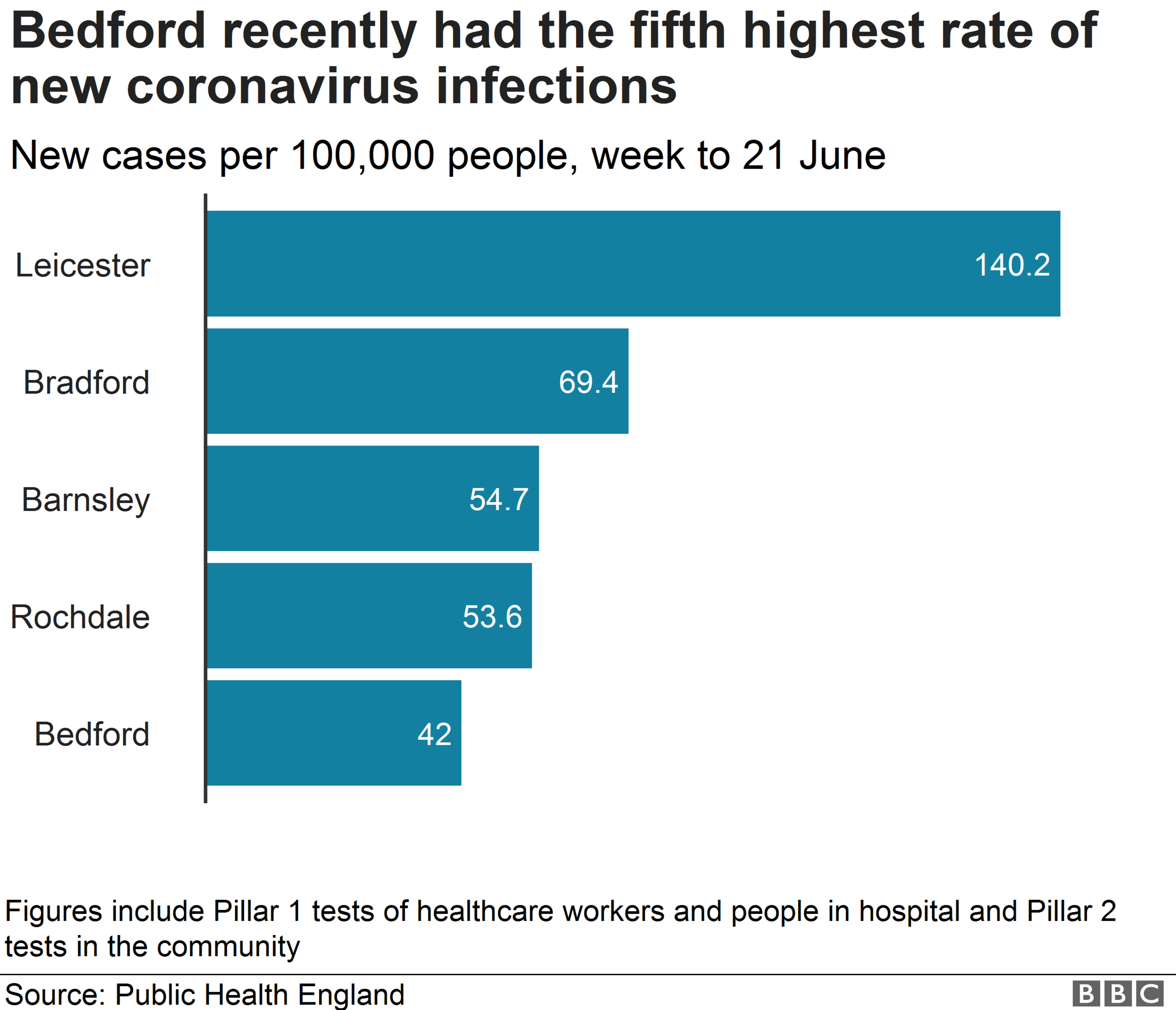
PHE has now started providing weekly figures for both sets of tests and they show Bedford had the fifth-highest rate of new infections per 100,000 people in the seven days to 21 June.
In Leicester, there were twice as many new infections as the next highest, Bradford.
The lack of the full data breakdown has been a big problem for local directors of public health who say it has hampered their ability to look for patterns and clusters developing.


Monique Hines is worried for her elderly relatives
Shop manager Monique Hines said she had seen a lot of people out in public not taking necessary measures.
"People are not using the marked pathways or they are standing too closely to each other," she said. "For me I am a young, fit individual and I have to take precautions as well.
"But it worries me that the virus can spread even if it doesn't affect you as dangerously as others. I think people should be taking the measures to protect others."
She said she was worried Bedford could be one of the next local lockdown towns.
"I've got elderly family so I am very worried. Every day you see on the news businesses close, more people being made redundant. It is worrying, are we going to be left with much on the high street?"

Jamal Waisome has sacrificed seeing his own mother in order to help control the spread of the virus
Resident Jamal Waisome said he did not know why the rate in Bedford was so high but had seen crowded areas.
"From the start I did see it was very empty in Bedford but then quite quickly it became very busy, especially around the park and the river area. People did try and keep their distance but perhaps it was not enough. That's what I believe."
The 25-year-old said he would support stricter measures being reintroduced.
"It does concern me a little bit. Places like Leicester have gone into a longer lockdown and I do think Bedford should go into a longer lockdown. I would definitely support it.
"I don't go and see my mum anymore and I always ensure I am socially distanced from people. I'm only going back to work now because we are going to be reopening and that is how it has to be."
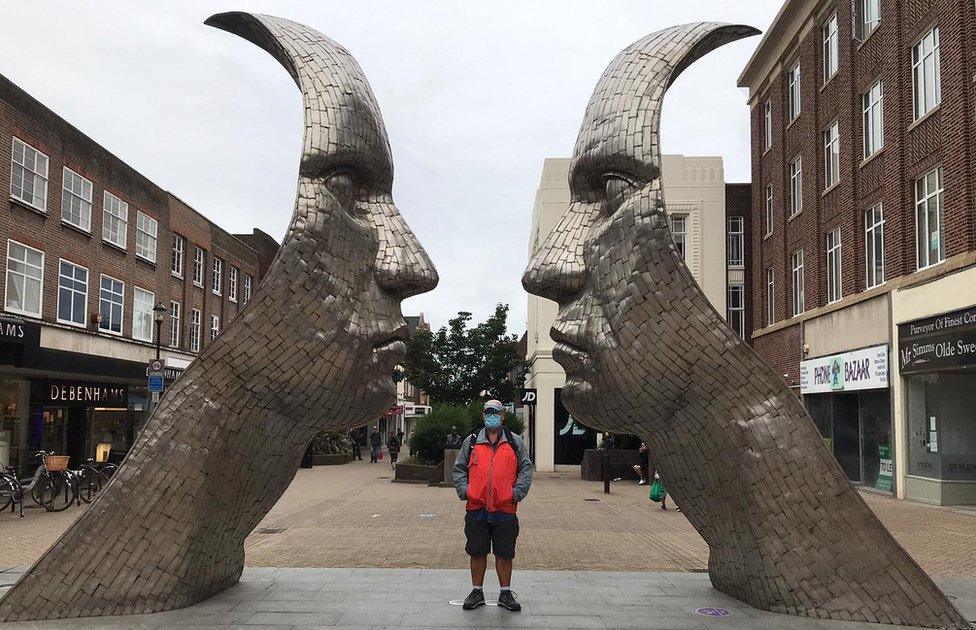
Dave Harman is moving to Bedford from Ecuador, where he says infection control measures are far stricter than the UK
Dave Harman, 65, is moving to Bedford from Ecuador, where he said measures have been stricter.
"I see the situation here so very different from where I have just come from. Masks are mandatory [in Ecuador], disinfection in stores is mandatory, everybody disinfects their feet and their clothes when they get home, in supermarkets they disinfect the conveyor belt before you're allowed to step forward, they disinfect all of the trolleys before you get close to them.
"So I see the probability of an increase [in infections] here significantly more than it was in Ecuador. And in Ecuador it was already fairly high."
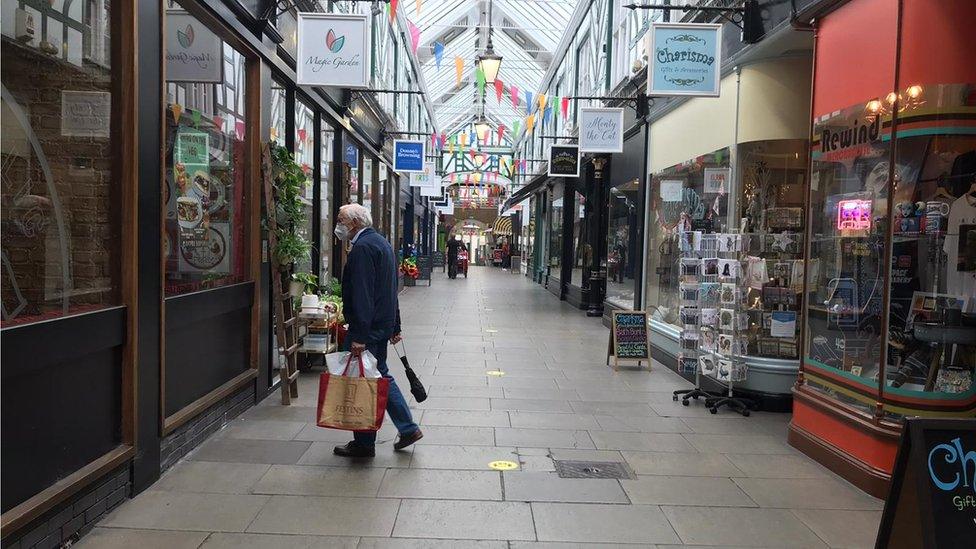
Public Health England said it was investigating the "high infection rate" in Bedford
The BBC asked PHE whether it had any early indications of why the borough has such a high infection rate. As yet, it is not in a position to provide any definitive answers.
Its regional director Dr Aliko Ahmed said it had been working closely with organisations such as the council to "help, support, advise and provide information on local situations and outbreaks".
He said: "As the epidemic has evolved, we have gained knowledge and data about the virus and we are now able to share more detailed information with our partners.
"We were seeing a higher number of cases in Bedford which is why PHE East, along with the Joint Biosecurity Centre and Bedford Borough Council, are doing a 'deep dive' to investigate the high infection rate and how we can work together help control the virus in the area."

A SIMPLE GUIDE: How do I protect myself?
RECOVERY: How long does it take?
LOCKDOWN: How can we lift restrictions?
ENDGAME: How do we get out of this mess?


Find BBC News: East of England on Facebook, external, Instagram, external and Twitter, external. If you have a story suggestion email eastofenglandnews@bbc.co.uk, external
- Published25 June 2020
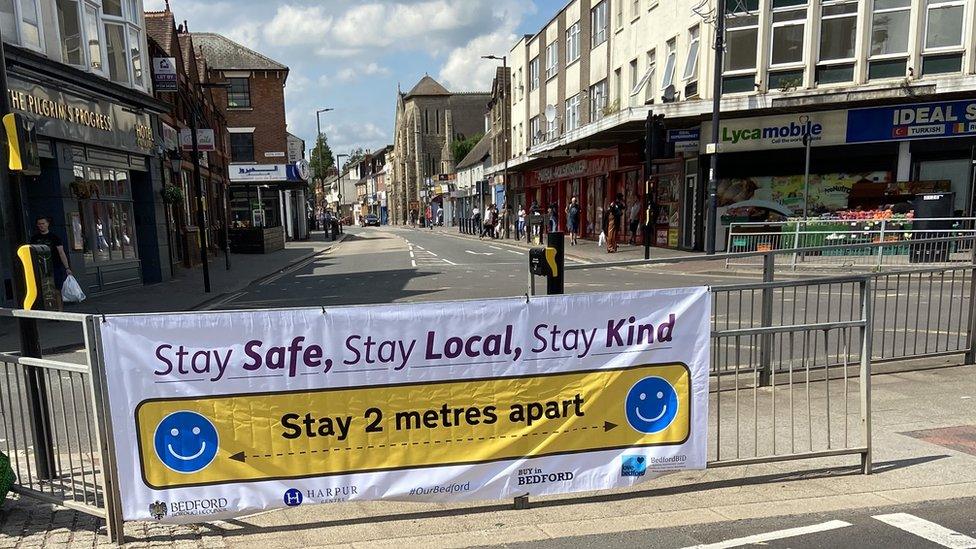
- Published24 June 2020
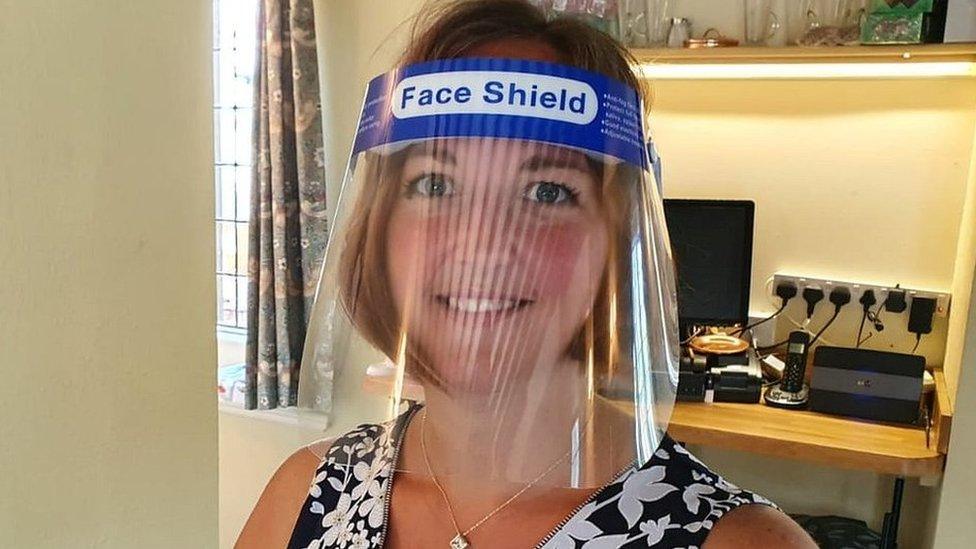
- Published5 July 2023

- Published15 June 2020
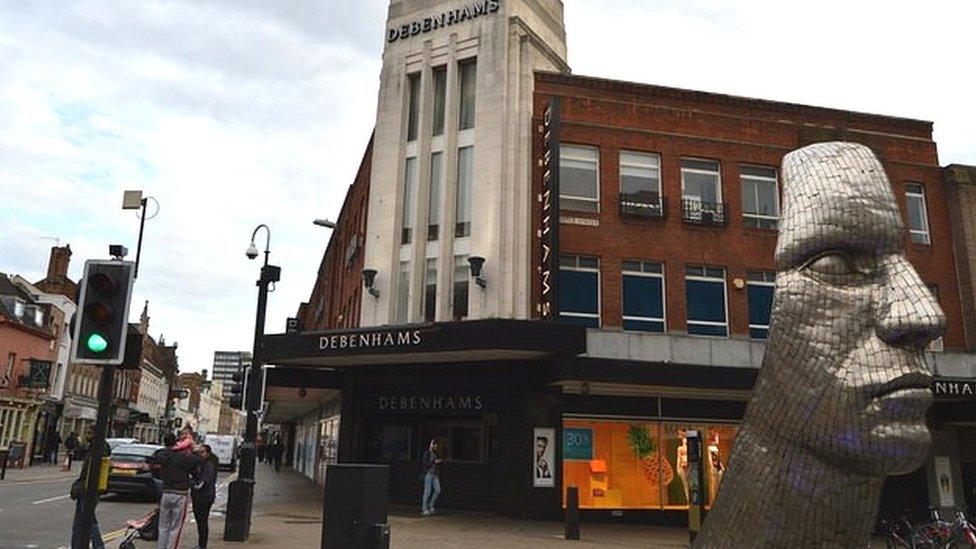
- Published25 May 2020
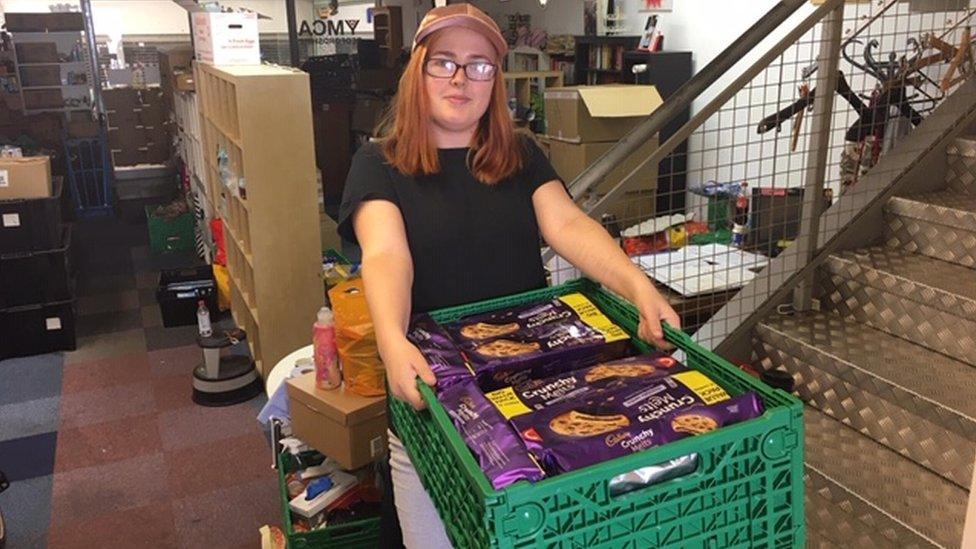
- Published23 March 2020
